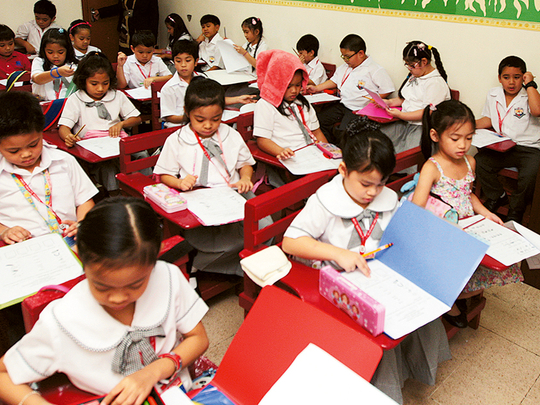
Abu Dhabi: Around 81 per cent of private schools in the capital provide adequate protection and guidance to their pupils, nearly double the number of institutions providing the same during the 2009-2011 academic year, the Abu Dhabi Education Council (Adec) announced.
In general, around 70 per cent of Abu Dhabi Emirate’s private schools have improved in their ‘effectiveness grade’, a recent round of inspections by the Adec revealed.
These results came after a total of 456 private schools were assessed by the Adec’s Private Schools and Quality Assurance (PSQA) sector over the course of three biennial cycles between 2009-2015. During these inspections, which were launched in 2009, schools were divided into three bands.
High-performing schools receive a Band A ranking, while satisfactory ones are in Band B and those that need significant improvement are placed in the Band C category.
“The current inspection cycle (2013-2015) results show that 55 per cent of private schools have at least satisfactory performance, of which 14 per cent, representing a total of 25 schools, are Band A (high performing) schools,” a statement by the council said.
During the cycle one (2009-2011) inspections, 72 per cent of private schools ranked in Band C and the number has gone down to 45 per cent during the third cycle (2013-2015). Meanwhile, Band B or ‘satisfactory’ institutions, have increased from 17 per cent to 42 per cent during the past six academic years, Adec reported.
In general, schools have shown an overall improvement across all performance standards during the past three cycles as 56 per cent showed at least ‘satisfactory’ student attainment and progress performance standards in comparison with 32 per cent during the first cycle.
According to Hamad Al Daheri, Adec’s PSQA executive director, schools have begun to make “informed and strategic choices” while refraining from exerting additional pressure on teachers and other key employees as the overall standard of the school was raised.
A post-inspection report issued by the Adec would highlight schools’ main strengths and weaknesses and a School Development Plan would then be required from the institution.
Only 17 schools are currently in Band C and have not shown any improvement since the launch of the inspections, prompting the Adec to issue them a warning letter.
“We will inspect each and every single one of these poor performing schools one last time during the Cycle 4 inspection cycle which starts in September 2015. If any of those schools continue to show poor improvement, Adec will take measures against them.
“Adec will not tolerate offering its students low-quality education under any circumstance,” Al Daheri added.












